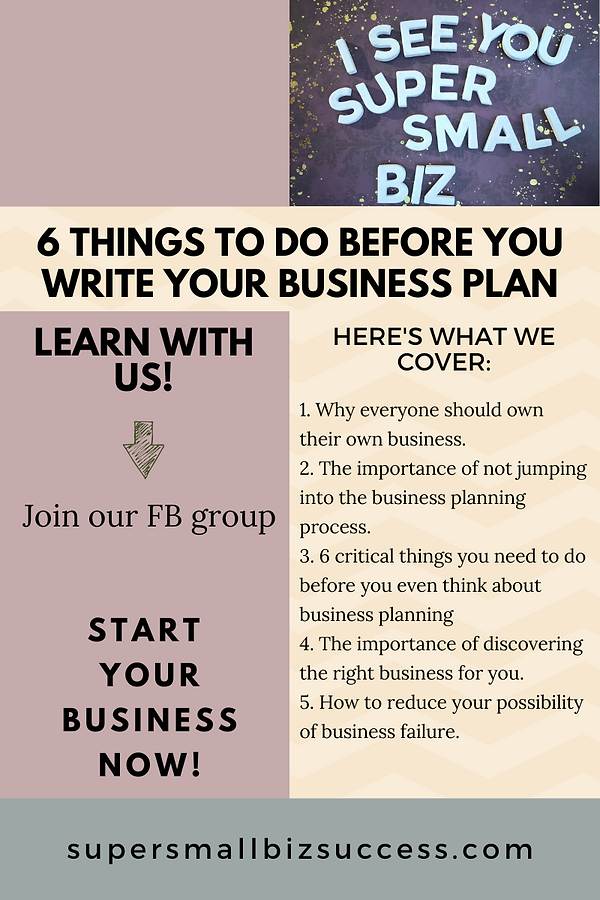Prepare

Anywhere you look, creating a business plan is the first step in exploring your potential venture. However, there is much more that you need to do before creating a business plan. You don't need a business plan until you've decided to go with a particular idea. Many hours can be dedicated to creating a business plan, so before you go down that rabbit hole, simply explore whether your business idea is something you are going to want to do for the long haul.
Contemporary business planning approaches have you creating a financial plan doing a SWOT analysis, and determining your business structure, before you even know if the business you are thinking about is worth all that time.
After several years of being a business owner and creating multiple successful organizations, I realized that the process I was using to create and start my new businesses was DIFFERENT.
SUPER SMALL BIZ VS. SMALL BIZ
Feel free to read my FREE Report that does a deep dive on the difference between a small business and a super small business and what the difference means to you. It's about a 5-7 minute read, but it really captures the essence of the problem going on in small business today.
The quick version is that a small business by definition (SBA or industry classification) can be a company with anywhere from 250-1000 employees. Now, I don't know about you, but you probably do not fit into this definition of a small business.
A super small business is one with 0-10 employees. Since about 80% of businesses fit into this category, this is probably what your business looks like.
A super small business is naturally one that has very little human resources and probably even fewer financial resources. Whereas a small business can probably survive poor product planning or a failed project, it is almost impossible for a super small business to stay solvent after a $100,000 mess up. That makes sense, right?
So why are we as super small business owners continuing to use small business theories and approaches? We don't have a Human Resources Department, a Manufacturing Plant, or an assembly line.
So why are we continuing to read textbooks and business approaches from the industrial age?
Because we don't know any different.
Would you agree with me that this could be why it continues to be broadcast that there is such a high rate of failure in small businesses? Maybe.
Would you agree with me that if you were given tools and resources that were geared toward your super small business, you would have a better chance at success? (Did the lightbulb go off?)
STOP using the antiquated practices of the small business era. Come to the realization that your business is different from the businesses those textbooks are talking about. The 4 P's of Marketing... ( one of the P's is for product placement - like where on the Walmart shelves your product is placed). Does anybody you know have "placement" in a big box store? I can count on one hand how many people I know that sell their products through a connection with a big box store. The rest of us? Our marketing plan looks a lot different.
Explore Your Business Idea
Hi, I’m LynMarie, Super Small Business Consultant and Attorney.
Looking at starting a business? Exploring your business idea is an exciting and essential step in determining its viability and potential for success.










.png)